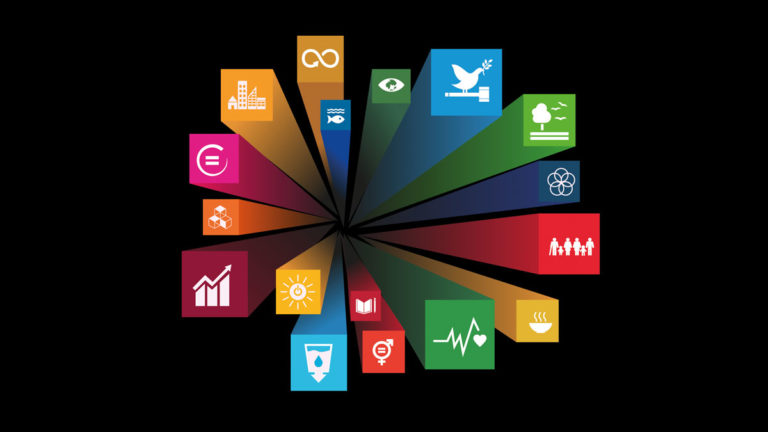The UN Sustainable Development Goals to Embrace for Supply Chain Optimization
Which of the UN’s SDGs do companies have to prioritise for effective supply chain oversight?

Governments are finally acting to make supply chain due diligence obligatory and companies are going to have to take steps to improve levels of oversight, action and reporting. With so many pieces of legislation on the horizon, organisations are embracing the UN’s Sustainable Development Goals (SDGs), which are designed to be a “blueprint to achieve a better and more sustainable future for all”. The implementation of an SDG framework can help an organisation achieve specific sustainability targets and six should be prioritised for effective supply chain management.
Background: SDGs
In 2015, all UN member states adopted the 2030 Agenda for Sustainable Development which provides a shared blueprint for peace and prosperity for both people and the planet, now and into the future. It has 17 SDGs at its core, and they represent an urgent call to action by all countries in a global partnership. Building on decades of work, they recognise that ending poverty and inequality must go hand in hand with strategies improving health, education and economic growth, together with a collective effort to tackle climate change.
The list of targets and indicators for each of the 17 SDGs was published in a UN resolution in July 2017 and they should be achieved on various dates between 2020 and 2030. The 17 SDGs are:
- No poverty
- Zero hunger
- Good health and well-being
- Quality education
- Gender equality
- Clean water and sanitation
- Affordable and clean energy
- Decent work and economic growth
- Industry, innovation and infrastructure
- Reduced inequalities
- Sustainable cities and communities
- Responsible consumption and production
- Climate action
- Life below water
- Life on land
- Peace, justice and strong institutions
- Partnerships for the goals
Each SDG typically contains between 8 and 12 targets that are considered either “outcome based” or “means of implementation”. A variety of tools are available to facilitate monitoring and progress towards goals and it was intended from the beginning to make data more easily available and understandable. An online publication called the SDG Tracker was launched in 2018 and it presents data across all indicators.
Relevance to corporate supply chains
Corporate supply chains have grown larger and more complex than ever before. When things go wrong, the human cost can be immense and long-forged reputations can be destroyed in an instant. Relatively recent real-world examples of disastrous supply chain management include a spate of suicides linked to low pay and brutal working conditions at Foxconn in China as well as the collapse of a garment factory in Dhaka that resulted in the deaths of 1,134 people.
Incidents like these are causing more and more companies to boost oversight and responsibility across the entire supply chain, all the way from the collection of raw materials to the manufacturing process and final delivery to the consumer. When supply chain management is handled directly and ethically, it can help an organisation achieve its sustainability goals, reduce its costs and improve its image. While an effective SDG framework and ESG strategy can drastically reduce a company’s environmental impact across the entire organisation, six SDG targets are especially relevant for global supply chain management.
The most important SDG targets for global supply chain management
The UN’s 2030 agenda does not directly refer to global supply chains but paragraph 63 affirms that “national development efforts need to be supported by an enabling international economic environment, including coherent and mutually supporting world trade, monetary and financial systems, and strengthened and enhanced global economic governance”.
The International Labour Organization states that it is possible to enhance the contribution of global supply chains to fair and inclusive growth if there is stronger coherence between economic objectives and decent work. As such, according to the ILO, several SDG targets are related to global trade and supply chains:
8.a Increase Aid for Trade support for developing countries, particularly Least Developed Countries (LDCs), including through the Enhanced Integrated Framework for LDCs.
UN SDG target 8a calls for the promotion of a trade agenda conducive to sustainable growth and the reduction of poverty through appropriate national policies and institutional frameworks in developing countries. It also specifically refers to the Enhanced Integrated Framework (EIF) which is a multilateral partnership dedicated to assisting such countries through the use of trade as a growth engine. The EIF consists of 51 countries, 24 donors and eight partner agencies that work closely with governments, academia, civil society and development organisations.
9.3 Increase the access of small-scale industrial and other enterprises, particularly in developing countries, to financial services including affordable credit and their integration into value chains and markets.
This goal centres around small and medium-sized enterprises having improved access to economic and business opportunities that can help developing countries boost social welfare and national productivity. The number of SMEs tends to grow in tandem with an economy and this requires broader access to long-term growth capital. As a result, better financing models superseding traditional banking need to be put in place so that economic opportunities for SMEs improve. This in turn helps raise the standard of living, reduce human rights violations and helps SMEs better connect to the supply chain.
9.5 Enhance scientific research, upgrade the technological capabilities of industrial sectors in all countries, in particular developing countries, including, by 2030, encouraging innovation and substantially increasing the number of research and development workers per 1 million people and public and private research and development spending.
Empowering science, technology and innovation has become critical to making economies resilient in crises, as was demonstrated by the Covid-19 pandemic. Investing in supply chain technology can help organisations simplify the entire process, eliminate unnecessary links, boost efficiency and reduce expenditure. Data is central to the future of supply chains and it will allow optimisation across shipping times, routes, weight and weather patterns which will lead to greater transparency and reliability. Research and development within this goal covers three types of activity – basic research, applied research and experimental development. Effective R&D investment in supply chains significantly mitigates the effects of environmental and process disruption on performance.
9.b Support domestic technology development, research and innovation in developing countries including by ensuring a conducive policy environment for inter alia industrial diversification and value addition to commodities.
Helping developing countries embrace modern manufacturing techniques has become essential for their future economic development. The process of structural transformation results in more diverse and higher-value activities. While modern manufacturing does not generate as much employment as low-skilled and labour-intensive manufacturing, it does generate well-paid jobs and income in addition to being central to increasing labour productivity. It also helps limit labour abuses in the supply chain.
16.3 Promote the rule of law at the national and international levels and ensure equal access to justice for all.
While this target does not have a single definition of “access to justice”, it is broadly concerned with “the ability of people to defend and enforce their rights and obtain just resolution of justiciable problems in compliance with human rights standards; if necessary, through impartial formal or informal institutions of justice and with appropriate legal support.” Given that human rights violations are rife across today’s supply chains, access to civil rights is imperative for people seeking to redress their grievances and for the entire sustainable development agenda.
17.11 Increase significantly the exports of developing countries, in particular with a view to doubling the LDC share of global exports.
Given that trade is a proven factor in generating economic growth and reducing poverty, this target aims to significantly grow the exports of the world’s least developed countries (LDC). This effort has been given added motivation due to the impact of the Covid-19 pandemic which saw LDCs register their worst economic growth since the early 1980s with merchandise exports alone estimated to have dropped 6.1% in 2020. A strong export-focused economy demonstrates that a country is capital intensive, pays fair wages, prioritises infrastructure and has a reliable source of foreign currency. That all helps strengthen the supply chain, whether it concerns a reduction in levels of poverty, the income flowing into a community or heightened shipping efficiency.
Conclusion
Keeping global supply chains free of human rights violations and environmental offenses is a massive challenge but it is also a critical mission. The risk of reputational damage to businesses has always been high and organisations now have to deal with a very real financial dimension as well due to the emergence of new supply chain due diligence legislation with harsh penalties for non-compliance.
Sustainable and successful business depends on the trust of all stakeholders. Openly embracing the UN’s SDGs is a serious statement of intent and making them as transparent as possible helps a business lay the groundwork for a better and greener future.

Key principles of establishing an effective ABC programme
